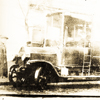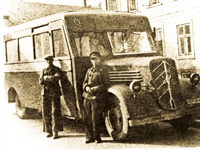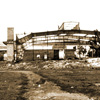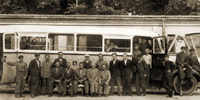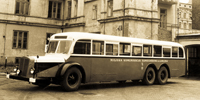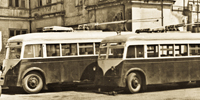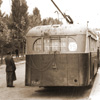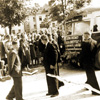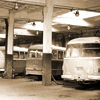- About the Company
- Scope of activities
- MISSION
- Authorities
- Contact
History
The history of the development of "MPK - Lublin" Ltd.
The first public transport vehicles in Lublin which appeared in the second half of the 19th century were carriages and horse omnibuses. In 1912 a bus network, involving three Benz – Hagenan bus vehicles belonging to Lublin Car Vehicle Company, was launched. This network, however, was far from perfect – the buses ran irregularly and broke down very often. Despite that, they were quite an attraction for the citizens. During this period a tram network was to be opened in Lublin; however, the outbreak of World War I interrupted the implementation of this idea, and triggered the liquidation of Lublin Car Vehicle Company. After the war, it was not until 1921, that the first public transport vehicles, in private ownership, appeared. This network, however, did not serve its purpose satisfactorily. Not much changed either after the undertaking of the service of public transport by the National Construction and Car Vehicles Operation Company. When the “Autopol” company took up the role of public transport provider, six buses were running around the city, within two communication lines. However, the conditions of travelling by these buses were unacceptable. Therefore, on 1 January 1929 the Municipality launched the company City Buses of Lublin. This date is regarded as the initiation of proper public transport in Lublin, with two lines launched - line A on the Station – Koszary route and B on the Station – Kalinowszczyzna route. The transport service was of much better quality than in the buses of “Autopol”. The problem was that there were too few buses, which resulted in an unsatisfactory frequency of their running and overcrowding. At that time, the company launched an advertising campaign by releasing a special bus on Krakowska Gate – the “Venus” cinema route – in which, when purchasing a bus ticket, the passenger was given a free cinema ticket as well.
Throughout the next years the company extended their service by launching more municipal lines, connecting the city with Kazimierz and Piaski, lines functioning during summers and holidays, and lines to Dębówka and Niemce. The company’s bus stock grew successively – in 1938 the company owned 12 buses of the makes Chevrolet, Henschel, Skoda and Ursus.
At the turn of 1938 and 1939 a depot was built at Garbarska St., which could hold and service 30 buses. The outbreak of World War II caused a practical cessation of public transport service in Lublin. In 1942 four Sauer buses were delivered from Germany, which ran first on two and then on one line – but mainly for the needs of Germans. During the war the depot at Garbarska St. was destroyed. Municipal transport was resumed in August 1944 with six Gaz trucks as well as offices and garages in the buildings at 4 Lipowa St.
During that time the company’s fleet comprised, besides the above-mentioned Gaz trucks, a Chevrolet bus, a Willys passenger car and a Harley motorcycle, and the crew numbered 16 persons (including seven drivers). On 13 April 1946 the first city line was opened on the Train Station – Lipowa St. route, which was later extended to the Barracks (Koszary). In the next months the fleet was successively expanded – in 1948 there were seven working lines serviced by 18 buses (with an average of 7-9 buses on the move). The Local Transit Company was then in possession of the above-mentioned Chevrolet and Sauer buses, accompanied by vehicles of the makes Magirus, Bedford, Fordson, and Bussing. In 1948 over 5 million citizens used public transport.
Bearing in mind the development of the company and the growing number of passengers, in 1947 a rebuilding of the depot at Garbarska St. was initiated; it was ready for service in 1949.
The next years witnessed two subsequent changes to the company’s name – in 1950 to Miejskie Zakłady Komunikacyjne (the Municipal Transport Service), and in 1951 to Miejskie Przedsiębiorstwo Komunikacyjne (the Municipal Transport Company). The poor condition of the fleet, the low frequency of buses and the growing number of passengers made it necessary to start the construction of a trolleybus network in 1952. The first trolleybus appeared on the streets of Lublin on 22 July 1953.
The first, 7 km long, trolleybus line was used by eight ITB-type Soviet trolleybuses. However, due to their poor technical state, frequent repairs and conservation works, on average there were only three vehicles on the move.
The situation slightly improved in 1955, when MPK obtained six Czech Skoda trolleybuses. At the same time the bus fleet was extended with modernised Ikarus buses. In 1954 the first two night lines were introduced. In the next years the company’s vehicle stock grew progressively – the first petrol-run Star vehicles appeared. In 1955 the total length of the routes amounted to 81 km. The number of vehicles on the move also increased – this, however, did not solve the problem of the growing overcrowding on MPK’s vehicles, caused by the constantly increasing number of passengers (at that time over 17 mln citizens used public transport). Despite the continual growth of the stock, the travelling conditions were far from perfect. This resulted from the overuse of the stock, which lacked spare parts, as well as the limited size and technical equipment, and high defectiveness of new vehicles. Attempts were made to save the situation by introducing new work organisation, i.a. developing a three-shift work system. In 1957 the construction of a modern (at that time) bus-trolleybus depot started in the Helenów District; it was intended to hold 100 vehicles. In January 1960 the first hall within this object was erected and the whole investment plan was completed in spring 1963. In 1964 the Municipal Transport Company ran 13 bus and 10 trolleybus lines; consequently, the stock underwent gradual renovation and growth. Employment in the company was also on the increase, although hindered by the shortage of qualified workers. The situation slightly improved when MPK took charge of the Basic Vocational School for Working Students in Celejów. In 1967 in buses and in 1968 in trolleybuses the ticket inspector’s seat was disposed of. Instead, the position of so-called observers was introduced, whose task was to supervise the regularity of vehicles’ journeys and ticket inspection among passengers. In 1969 many changes in the communication system in Lublin took place – at that time 20 bus and 15 trolleybus lines were functioning. The total number of passengers using public transport amounted to 77 million. A still-unsolved problem was the overcrowding on public transport vehicles, especially during rush hours. In 1970, MPK submitted an application to the Department of Mucipal Services and Housing Management of the National Municipal Council for differentiated times of work in particular workplaces in the city, which would reduce the overcrowding on MPK vehicles. Due to the lack of supplies to the trolleybus stock, electric traction began to gradually decrease. In the place of discontinued trolleybuses, bus lines were established. In January 1970 the Drivers Training Centre was organised by the company. In the years 1971, 1972, and 1973 Municipal Transport Company was ranked among top public transport companies in Poland, respectively winning 3rd, 2nd and 1st place in inter-company competitions between state entities from this sector. In 1972 the Basic Vocational School for Working Students under MPK was moved from Celejów to the building of the Primary School in Piotrków. In 1973 a new traffic system was introduced in Lublin, which provided as many as possible direct connections from the place of living to the place of work and vice versa, liquidated the radial system of lines, introduced the diagonal system, and increased the frequency of vehicles running during peak hours. The trolleybus traction was still being replaced by bus lines due to the lack of new trolleybus supply – the proportions of bus lines to trolleybus lines were at that time 34 to 9.
Among the major investments undertaken that year we find the modernisation of the rectifier station at Szczerbowskiego St., adapting the land near Młyńska St. for a temporary depot and modernising the Helenów Depot. On 13-15 September 1974 Municipal Transport Company in Lublin played host to the 15th National Municipal Transport Meeting. The programme, apart from lectures, debates and discussions, also included a “social evening” and trips for the participants.
On 1 September 1974 the Basic Vocational School for Working Students under MPK once again changed its location, this time to the building of Primary School No. 1 in Lublin at Kunickiego St. In 1975 a microbus network was launched on a fast transport basis. Initially there were four communication lines with 20 “Nysa” microbuses. Tickets were sold by drivers and validated in ticket punchers installed in the buses. In October 1975 MPK received its first 3 trolleybuses of Soviet production, which constituted the beginning of the implementation of the delivery contract concerning these vehicles. In the same year Municipal Transport Company received ten Fiat 125 cars for the purpose of organising a taxi network. In 1976 MPK’s fleet was expanded by 59 Autosan buses, 7 Jelcz buses, 9 “ZIU” trolleybuses and 29 taxicabs, which allowed the extension of the existing lines and launching new ones, including fast lines. During the summer the company organised so-called green lines to the Dąbrowa forest. Despite that, considering the progressive growth of the city and the increase in population, the shortage of public transport means in Lublin was still apparent. Moreover, stock deliveries worsened the situation of the company’s technical resources and the problems with parking space for the vehicles intensified. It was thus necessary to build a new service station for microbuses and taxicabs at 7 Młyńska St.
In July 1976, the Municipal Transit Company in Kraśnik was founded, being an affiliate of MPK in Lublin. At the beginning 37 “San” buses were transferred, which allowed the launching of ten communication lines with a total length of 131 km. In the same year the Basic Vocational School For Working Students under MPK acquired its own building in Głusk. Better room conditions allowed it to extend the school’s profile with new specialties, i.e. panel beater and car electrician, next to the existing driver-mechanic trade. In addition, in 1976 the Secondary Vocational School for Working Students was established. It served the purpose of raising the qualifications of MPK workers in the following speciality classes – cars and tractors; operation and transportation in public transport. In 1977 the vehicle fleet of MPK in Lublin increased, with 25 Jelcz buses, 5 Jelcz articulated buses, 27 Autosan buses, 14 “ZIU” trolleybuses and 20 “Wołga” taxicabs. Two years after the introduction of microbus transport in Lublin, it was decided that it should be discontinued. This was based on the constantly diminishing number of passengers in these vehicles resulting from the increase of the number of “ordinary” buses.
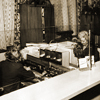 In March that year the ticket offices were moved from Lubartowska St. to a new office at Świerczewskiego St.
In March that year the ticket offices were moved from Lubartowska St. to a new office at Świerczewskiego St.
The following years brought a further growth in the MPK vehicle fleet – in 1978, for instance, the company obtained 15 modern Berliet buses, which could hold 110 sitting and standing passengers. These vehicles initially ran only on the newly launched Zadębie – Węglin route and served as training vehicles for MPK staff. In addition, another 6 Soviet trolleybuses joined the fleet. The same year also saw the introduction of a radio-taxi system in all taxicabs belonging to MPK, which involved equipping the cars with radiotelephones.
As a result of passengers voting in the “Exquisite MPK Driver” contest, organised by MPK and “Sztandar Ludu” daily, three long-standing MPK drivers were recognised for their skills: Marian Bojanowski, Jan Mysza and Lesław Wal, who, apart from outstanding driving skills excelled in personal culture. Another competition for the title of the best driver, organised by the Voivodeship Association of Municipal Services and Housing included drivers from the region. In this contest the winner was Ryszard Kukałowicz from MPK Lublin. In September 1978 MPK Lublin hosted the meeting of Bus Fleet and Supply Committee acting under the Institute of Environmental Engineering in Warsaw. Discussions were held on the current problems of public transport companies, i.a. the constant shortage of parts, etc.
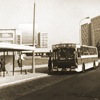 At more or less the same time new bus stops appeared in Lublin. New residential districts, e.g. Czechów, were given new public transport connections. On 13 December 1978 a Company Radio Station started broadcasting. 1979 was the year of the 50th anniversary of public transport in Lublin. MPK was then in possession of 352 buses and 54 trolleybuses; on average, they carried 500 thousand passengers a day. The company had nearly 2000 employees. It was a year in which the size of the company’s fleet did not increase, on the contrary, many old vehicles were scrapped and the supplies of new ones were much lower than expected. In June 1979 two-journey tickets were introduced. Due to the constant development of motorisation and the increasing number of citizens, in 1980 traffic congestion on the streets of Lublin became a serious issue. In addition, crumbling tenement houses at Krakowskie Przedmieście St. became a threat to traffic routes and forced the limitation of public transport activity in the area, and consequently a change in the MPK lines. Apart from this, too small a number of public transport vehicles, compared to the citizens’ needs, especially during rush hours, resulted in their overcrowding. An attempt was made to solve this problem, for instance by pointing out, by the committee, workshops, schools and institutions in which the hours of starting and finishing work should be changed. The actual vehicle stock supplies were smaller than expected – only trolleybus supplies were performing according to plan. This, however, did not improve the transport situation in the city very much. The reason was maladjusted trolleybus traction and shortage of drivers. The concept of creating a tram network in Lublin was again taken into consideration. Geotechnical analysis was performed, track and track beds were investigated and an engineering plan study was prepared (potential overpasses and tunnels).
At more or less the same time new bus stops appeared in Lublin. New residential districts, e.g. Czechów, were given new public transport connections. On 13 December 1978 a Company Radio Station started broadcasting. 1979 was the year of the 50th anniversary of public transport in Lublin. MPK was then in possession of 352 buses and 54 trolleybuses; on average, they carried 500 thousand passengers a day. The company had nearly 2000 employees. It was a year in which the size of the company’s fleet did not increase, on the contrary, many old vehicles were scrapped and the supplies of new ones were much lower than expected. In June 1979 two-journey tickets were introduced. Due to the constant development of motorisation and the increasing number of citizens, in 1980 traffic congestion on the streets of Lublin became a serious issue. In addition, crumbling tenement houses at Krakowskie Przedmieście St. became a threat to traffic routes and forced the limitation of public transport activity in the area, and consequently a change in the MPK lines. Apart from this, too small a number of public transport vehicles, compared to the citizens’ needs, especially during rush hours, resulted in their overcrowding. An attempt was made to solve this problem, for instance by pointing out, by the committee, workshops, schools and institutions in which the hours of starting and finishing work should be changed. The actual vehicle stock supplies were smaller than expected – only trolleybus supplies were performing according to plan. This, however, did not improve the transport situation in the city very much. The reason was maladjusted trolleybus traction and shortage of drivers. The concept of creating a tram network in Lublin was again taken into consideration. Geotechnical analysis was performed, track and track beds were investigated and an engineering plan study was prepared (potential overpasses and tunnels).
In July 1980 a new service hall was built for “Berliet” buses at Nałęczowska St. The extension work on the substation at Garbarska St. was finished and construction of a new depot in Majdan Tatarski was commenced. Also, at that time, due to a growing economic and socio-political crisis in the whole country, demonstrations and strikes began. The first strikes in MPK Lublin took place on 18 July. Passenger transport in the city ceased completely. During the first days of September 1980, on the site of our company, the Temporary Founding Committee of Independent Self-Governing Trade Unions was established. In reaction to the constant devaluation of the Polish zloty, increasing inflation, and shortage of basic food articles, MPK employees submitted demands and proposals for implementation. They involved improvements in social conditions of employment and allowing unrestrained activity of Independent Trade Unions. In 1981, due to fund shortages the MPK taxicab network was discontinued. Throughout the 5 years of its existence the costs of its maintenance were higher than its income. Most of the taxicabs owned by MPK had reached the mileage of over 200,000 km, so, in accordance with mandatory regulations, they should not be used further. Also, there was a shortage in new car supply. Another serious problem of MPK at the beginning of the 1980s was too narrow a depot. In 1981 the reconstruction of the depot in Majdan Tatarski was already in progress, yet, due to lack of space, the decision was made to temporarily park some trolleybuses along Mełgiewska St. The critical situation connected with the lack of many different spare parts for buses, especially accumulators and tyres, resulted in reductions in staff on several bus lines, and the shortening of routes for other buses. Some routes were even temporarily suspended. The situation worsened even further when the relatively new “Berliet” buses were disposed of due to their construction flaws. In 1982 Lublin received new, articulated Ikarus buses. They turned out to be spacious and, compared to Berliets, more durable. Nevertheless, some problems emerged –because of their length, they were not able to take some sharp turns; consequently they could not be used for certain lines. In April 1982 the Mayor of Lublin approved, as a founding body, the statute of MPK in Lublin. This document described the legal relations between the company and its surroundings, the authority of the company’s bodies, and mutual relations between them. In comparison with previous regulations, the bodies of the company gained greater independence. Furthermore, in June the company’s organisation regulations and rules were introduced. In June 1982, at the meeting of the representatives of six public transport companies from the country (including MPK) the Association of Municipal Public Transport Companies of Poland was established for the purpose of cooperation between public transport companies, representing the common interests of companies and performing services for other members of the association. The concept of a tram network in Lublin was again taken into consideration. The “Metroprojekt” company introduced four self-prepared variants of a tram network setup, based on the assumptions of the prospective city spatial development plan. “The problem of the construction of a tram network in the Lublin urban area” was the main topic in a nationwide scientific-technical conference which took place on 11-12 May 1982 in Lublin. In 1982 the vocational school operating under MPK once again changed its location. This time, from Głusk it was moved to the building of the Primary School in Jastków. On 1 September 1983 the Technical School for Motor Vehicle Engineering was established and the school took the name of the MPK Complex of Motor Vehicle Schools in Lublin, based in Jastków. The complex comprised three schools then - the Basic Vocational School, the Secondary Vocational School and the Technical School for Motor Vehicle Engineering.
The continuing problem of the lack of stops for MPK vehicles was slightly mitigated in 1983 when MPK took over the land left after the old brickyard along Nałęczowska St. In January that year the Mayor of Lublin approved the reactivation of the MPK Staff Board, suspended when Martial Law came in force; in March the Independent Trade Union of Lublin Municipal Transport Company Workers was entered into the trade union register. In 1984 the last Jelcz and Autosan buses were withdrawn from the streets of Lublin. Only Berliets and Ikaruses remained in use. The construction of the first part of a new depot in Majdan Tatarski was finished. It had parking places for 300 buses, a petrol station, a paintshop, a daily maintenance hall, a diagnostic centre, warehouses and social facilities.
On 15 December 1985 in the grounds of the new depot in Majdan Tatarski a main repair hall was built, equipped with repair stations, panel beating stations, training centres and social quarters for the staff – it was the time when the official “removal” of Bus Transport Centre No. 2 to a new depot took place. The completion of the Majdan Tatarski depot construction followed in 1986. On 1 February 1987 the Construction Office of the Fast Tram Network in Lublin was founded for the purpose of preparing the technical documentation and organising a new investment – Lublin Fast Tram. Every year the cost of the company’s maintenance increased; this was connected with the fast-growing prices of materials and spare parts. In 1989 there was a serious shortage of drivers which amounted to 100 less than the number required to fully use the company’s vehicle fleet. It resulted from the low wages that the company offered its employees. Budgetary grants only partially satisfied the existing needs. Three increases in ticket prices during that year – in April, August and November – did not make much difference. The income from ticket sales covered only one third of the company’s activity cost. During that time MPK introduced its own ticket sales system – one could buy them not only from “RUCH” kiosks, but also on MPK vehicles, in shops and from individual sellers. Due to financial difficulties, on 1 October the night lines and some suburban lines were withdrawn, and some others were reduced. Some bus stops in the city were also removed. At the beginning of 1990 the Municipal Transit Company in Kraśnik became an independent entity. On 1 January 1991 the Complex of Motor Vehicle Schools in Lublin was placed under the supervision of the Education Supervisory Agency. In August that year the Municipal Transport Company in Lublin ceased to exist as a state enterprise and, subject to the Resolution of the Board of Lublin of 1 September 1991, it became a Budgetary Entity. In 1992 MPK Lublin, as the first municipal transport company in Poland, introduced a season-ticket system. From that time, passengers could buy season tickets for one or all the city lines, valid for 7, 10, 15, 30 or 90 days. Two years later, i.e. in July 1994, a single time-limited ticket system was introduced. The passenger validated a 10-minute, 20-minute or 60-minute ticket, depending on the length of the route he/she wanted to travel, and consequently on the time required to travel. In April 1994 the Municipal Transport Company extended its activities, offering transport service to the handicapped, using microbuses specially prepared for this purpose. In the same year, due to the renovation of the main Lublin street, Krakowskie Przedmieście St., the trolleybus traction installed there was removed.
In 1996 the first low-floor buses appeared in Lublin – first, four Jelcz M121 buses and some time later – Neoplans. In 1998 the Municipal Transport Company operated 43 bus lines (and 5 suburban ones) and 9 trolleybus lines. On 3 October 1998 three modern trolleybuses, constructed by MPK using the Jelcz car body design, were officially put into operation. Moreover, apart from the stock for regular transport service, the company is also in possession of vehicles constructed especially for the handicapped. These are three Volkswagen microbuses which have been adjusted to seat three persons on wheelchairs and two accompanying persons. They are equipped with special elevators for loading wheelchairs with people sitting on them.
On 1 January 1998 the Municipal Transport company in Lublin changed its corporate status from budgetary entity to limited company. This brought about many changes in the management and organisational structure and the activities of the company. The new legal and economic situation led to seeking new solutions to meet the constantly-growing need of Lublin citizens for well-functioning public transport. On a monthly scale 10 mln passengers travel using MPK services.
Unlike other Polish cities, in which the trolleybus network has been removed, Lublin favours ecology. Progressively, although slowly, the trolleybus network is being extended – on 31 August 2000 a new section of the trolleybus line and a trolleybus loop were built at Chodźki St. In August 2001 the first JELCZ EKO-BUS M121E trolleybus was constructed in the MPK works to the JELCZ M121 car body design. It is a low-floor, low-energy trolleybus, which, thanks to its electronic engine control circuit, saves 30% of its energy. The most recently produced MPK trolleybuses have a modern control circuit, which significantly improves travel comfort and saves energy.
MPK Lublin Ltd. is also concerned with activities connected with the automotive industry. In February 2000, on the site of the trolleybus depot at Nałęczowska St., the Regional Vehicle Inspection Centre established its activity, offering a wide range of inspection services for all kinds of vehicles. A little later, an oil filling station and tyre service for all kinds of vehicles were opened. It is thus clear that, despite many objective problems the Polish economy faces, MPK Lublin Ltd. is continuously broadening its package and cares about the high quality of its services.
One proof for this is the purchase of new stock. In April 2008 a low-floor Solaris Trollino 12 trolleybus appeared in Lublin; it was a part of the project co-financed by the European Union from the European Regional Development Fund under the Integrated Regional Development Operational Programme. In summer 2008 the bus stock was enriched with 20 new Solaris Urbino 12 buses. The purchases did not stop there – 30 vehicles – this time Mercedes Conectos – came to Lublin in July and September 2009.
The status of the Municipal Transport Company has also changed, as, according to a 10-year agreement concluded between MPK and Lublin Commune to perform public transport services, since 1 December 2009 it has become one of the bus operating companies. The agreement clearly distinguished the role of a bus operating company from a municipal transport managing company; this role was taken by the Public Transport Authority. Regulations concerning the funding of MPK also changed. Due to the fact that income from the sale of public transport tickets is directly transferred to the commune budget, the company is no more entitled to receive subsidies from the Lublin commune. The source of income is now remuneration for performing public transport services on bus and trolleybus lines and for assistance services.
- Tips for passengers
- Timetables
- Customer Service
Information on the operation
of public transport
tel. (81) 525-32-46

